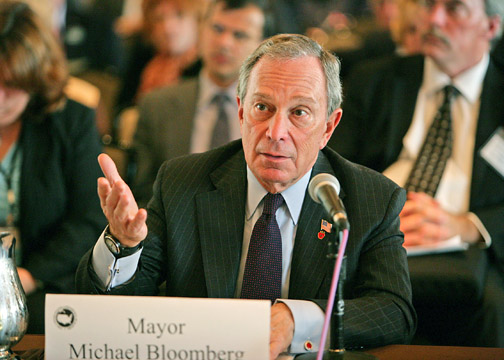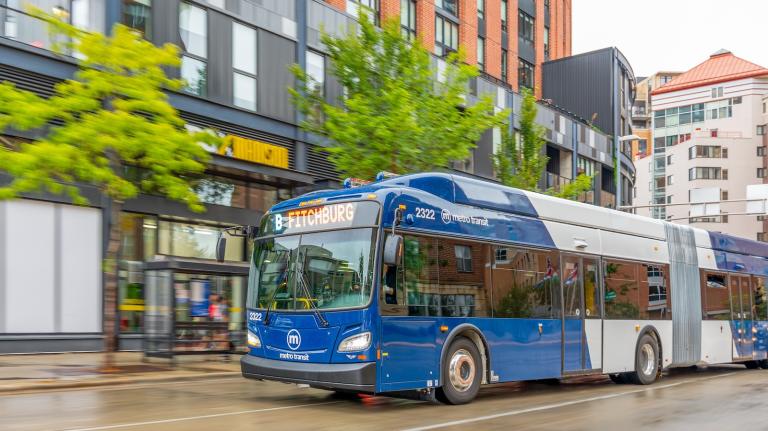The last event at this weekend’s mayors conference was a field hearing by the House global warming committee. The witnesses were:
- Mayor Bloomberg, City of New York
- Mayor Diaz, City of Miami, Florida
- Mayor Nickels, City of Seattle, Washington
- Mayor Palmer, City of Trenton, New Jersey
Committee hearings tend to be pretty staid affairs, but some sparks flew at this one.
When committee Republicans James Sensenbrenner (Wisc.) and Greg Walden (Ore.) expressed the common conservative concern that addressing global warming would drive jobs to China and India — and thus, implicitly, that the U.S. shouldn’t do anything until they do — Bloomberg kind of flipped.

(photo: U.S. Mayors Conference)
The event was recorded, so I assume a transcript will be available at some point, but just going from memory it went something like this:
"Continuing to pollute to teach them a lesson doesn’t make any sense to me. You can’t make them do anything, you can just do it and hope they follow. This is America! Since when do we wait on other countries to make progress? You’re pushing on a string! I can’t tell New York City we’re going to do nothing because people on the other side of the world are. This is America!"
And so on.
By the end poor Walden was sputtering, "you’re missing the point! You missed my point!" I almost felt bad for him — unlike Sensenbrenner, who really is as dense as Bloomberg’s reaction would lead you to believe, Walden’s actually a reasonable guy. He just wanted to know how to prevent jobs from going overseas in response to higher energy prices.
Bloomberg’s substantive reply is that energy prices aren’t that decisive a factor; labor prices are a bigger deal. America’s most important assets are its dynamism and innovation, the quality of its engineers and scientists and entrepreneurs. We should be more worried about poor education, anti-immigrant policies, and anemic R&D funding — those are sapping America’s real strengths.
When Sensenbrenner offered the other conservative nostrum — "isn’t it technology that will save us, not regulations?" — Bloomberg practically shouted, "we cut our energy R&D by two-thirds since the ’70s! R&D is leaving this country!"
Aside from Bloombergian fireworks, the hearing offered a few common themes. The mayors were obviously proud of what they’d accomplished, but they stressed over and over again that they need a partner at the federal level. Over and over again, they referred to the $4 billion energy efficiency block grant the U.S. Mayors Conference has requested (PDF) to help cities fight climate change. They stressed that different cities are at different places on this, and have different needs, and a one-size-fits-all approach would be ineffective. In other words: give us the damn money and let us figure it out.
At one point, Jim McDermott (D-Wash. — not on the committee, but invited to join the hearing) said, "one of the arguments we constantly hear is, oh, the mayors will just waste the money. What would you do with $100 million?"
Seattle mayor Greg Nickels picked up a booklet and said dryly, "well, we took the time to write up a plan." Trenton, N.J., mayor Doug Palmer — president of the Mayors Conference — said (again I’m paraphrasing):
"We hear this all the time. We know what to do with the money. We help millions of Americans every day. You want to talk about waste? Let’s look at Iraq. And mayors get grief? We don’t want a handout, we want a partner. We want to be accountable. Let’s work together."
Miami mayor Manuel Diaz — who I found among the most impressive mayors in Seattle this weekend — argued forcefully that mayors seek and would welcome a set of common benchmarks. "The crucial thing is creating measurements, getting audited, standards, something we can measure."
The overall tone of the hearing was respectful and encouraging. In his final words, Rep. Jay Inslee (D-Wash.) made what sounded like a promise: "The cavalry is on the way."


